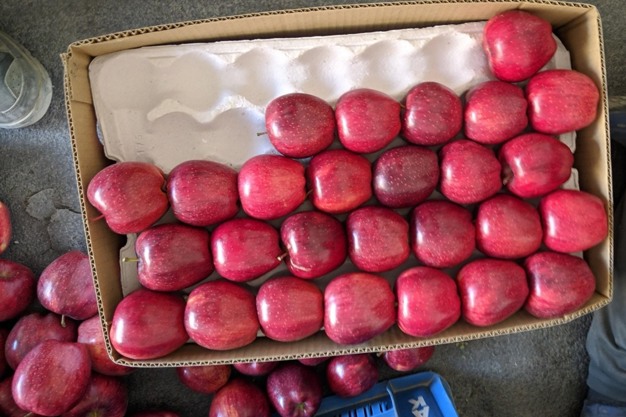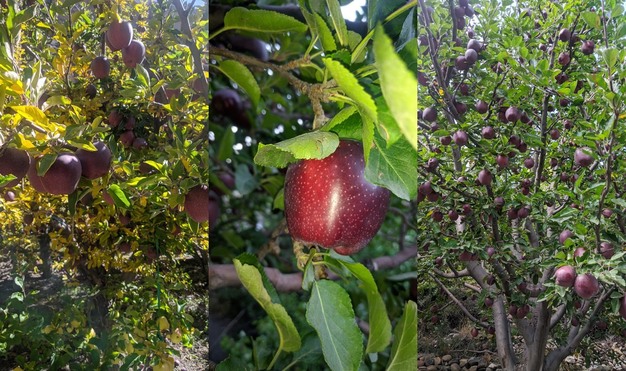The organic apple sector in India is steadily growing, though the pace could improve, says Ashish Banerjee, Chief Business Officer of Indian organic apple trader KGF Organic Farms: "The organic apple market in India is gradually evolving, though growth is relatively moderate. The Indian government is actively promoting organic farming through various policies and incentives, which is helping to raise awareness and drive demand. However, the organic market is still quite small compared to conventional produce, and consumer adoption is in its early stages."
According to Banerjee, consumers still have some worries, but interest is increasing nonetheless. "Retailers are beginning to include organic apples in their product offerings, but challenges such as higher prices, and consumer scepticism about organic labelling continue to affect market expansion. Despite these hurdles, there is a growing interest in organic products, particularly among health-conscious urban consumers. This interest is expected to drive steady growth in the organic apple market in the coming years as availability improves and awareness increases."

Looking at specific varieties, one organic version of a variety is a clear winner among the consumers in India, Banerjee states: "The Red Delicious variety is by far the most popular organic apple among Indian consumers, accounting for nearly 90% of the organic apples consumed. Other varieties, such as Royal Gala, Dark Baron Gala, Golden Delicious, and Granny Smith, are also available in the market and are gradually gaining attention. However, they currently make up a smaller share of consumption. Red Delicious remains the preferred choice due to its familiarity and widespread availability, though there is a growing interest in other varieties as consumer preferences evolve and more options become accessible."
For both conventional as well as organic apples, the production in India is higher this year compared to the previous season, Banerjee explains. "This season has seen an increase in overall apple production compared to last year, with a significant improvement in quality as well. Last season, unexpected weather changes led to quality issues, particularly 'rusting' in organic apples. This year, however, favourable weather conditions have contributed to higher yields and better-quality apples, resulting in a stronger season overall for producers."
Although the organic apple cultivated in India is facing a lot of competition from other origins, Banerjee feels that there's a solid place for them in the market: "Organic apples grown in India face stiff competition from both imported organic and conventional apples, but they have distinct advantages that help them carve out a unique market position. Indian organic apples generally have a pricing edge over imported organic apples, due to lower logistics and import duties. Imported organic apples are typically priced higher, while Indian organic apples are more affordable for local consumers. For example, imported organic apples can cost around ₹400–₹500 per kilogram, whereas Indian organic apples are usually priced at ₹200–₹250 per kilogram, making them more accessible to price-sensitive buyers. Indian-grown organic apples are also fresher when they reach consumers, as they don't undergo lengthy transit and storage times like imported apples."

There's also a certain trust towards organic apples grown in certain regions in India, compared to others, Banerjee states. "Apples grown in regions like Himachal Pradesh and Jammu & Kashmir, with optimal growing conditions, are gaining consumer trust for being free from pesticides and chemicals. While some consumers still view imported apples as superior due to stringent quality controls, which can attract higher-income groups, Indian organic apples are steadily gaining popularity for their health benefits and local origin."
That being said, there's an abundance of apples on the market in India from a wide variety of origins that also compete with the organic apples cultivated in India, Banerjee explains: "Imported conventional apples, especially from the U.S. and New Zealand, are widely available and often attract consumers with their competitive pricing and polished appearance. These apples are typically priced around ₹180–₹250 per kilogram and present a challenge to Indian organic apples, especially among price-sensitive consumers who may prioritise aesthetics or cost over organic certification."
"While imported organic apples maintain a niche market position in high-end retail, demand for Indian organic apples is steadily increasing. More consumers are willing to pay a premium for locally grown organic apples, viewing them as a healthier alternative to conventional imports and a way to support domestic agriculture. With growing awareness, Indian organic apples are becoming more accessible through mainstream retail and e-commerce platforms. In summary, Indian organic apples are becoming increasingly competitive, especially among consumers who prioritise freshness, affordability, and environmental benefits. While imported organic and conventional apples continue to hold a strong presence, Indian organic apples are gaining momentum as a more affordable, local, and health-conscious alternative," Banerjee concludes.
Next week, Ashish Banerjee will return to discuss the future of the organic apple cultivation in India.
For more information:
Ashish Banerjee
KGF Organic Farms
Tel: +91 8600165706
Email: [email protected]
www.kgforganicfarms.com
